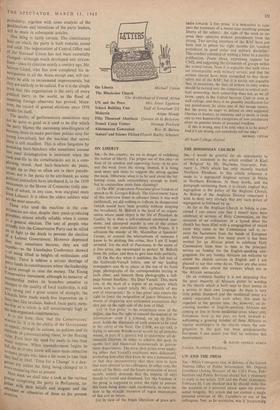On Liberty Michael Lipton The Rhodesian Church The Archbishop of
Central Africa UN and the Press Mrs. Joyce Egginton School Building Cuts Stag of Lortgslade GS Malaysia Angus Maude Fifty Thousand Abortions Quentin de la Bedoyere Transit Camp Estates Norman Prichard Aldermaston Generation Rev. H. Barton `Aniara' and Science Fiction Elspeth Harley Schubert ON LIBERTY SIR,--In this country, we are in danger of redefining the notion of liberty. The proper use of this idea—at least of its emotive and approving force—is to pro- tect the weak from the strong. Instead, it is being used more and more to support the strong against the weak. Otherwise what is to be said about the fol- lowing cases, each extraordinary enough in itself, but in conjunction more than alarming?
(i) The BBC programme Panorama gives freedom of speech to M. Georges Bidault. The Government knew of this interview hours in advance (since it was welt publicised), yet did nothing to ildicate its disapproval (which would have been possible without stopping the broadcast). M. Bidault is the head of an organi- sation whose main object is the life of President de Gaulle: he is thus a self-confessed attempted mur- derer, and attempted murder is one of the crimes covered by our extradition treaty with France. If I advocate the murder of Mr. Macmillan at Speakers' Corner. or conceal the whereabouts of someone I know to be plotting this crime, then I am (I hope) arrested. Yet the staff of Panorama, in the name of a free press, are encouraged to protect M. Bidault from the police, and then to give him wide publicity.
(ii) On the day when it publishes the full text of the Galbraith-Vassall letters, one of our leading newspapers sees fit to place, at the top of its front page, photographs of the correspondents leering at each other, and beneath these photographs a full- page banner headline: 'My Dear Vassall.' This, mark you, at the start of a report of an inquiry which seems sure to acquit totally Mr. Galbraith of any sort of impropriety ! So 'a free press' also covers the right to force the resignation of junior Ministers by means of disgusting and unfounded accusations that stay just on the right side of the laws of libel.
(iii) 'A free press,' in the unanimous view of the dailies, also has the right to conceal the sources of its information—even if a tribunal, set up by Parlia- ment, holds the disclosure of such sources to be vital to the safety of the State. The USSR, we are told, is trying to uncover British-naval secrets by all possible means, as part of a general bid to undermine all de- mocratic liberties. In order to achieve this goal,• its agents find and blackmail homosexuals in govern- ment departments. The press then prints news imply- ing either that Vassall's employers were dishonestly protecting him after they knew he was a homosexual, or that they incompetently shut their eyes to facts that were obvious to his colleagues. In either case, the safety of the State, and the future protection of naval secrets, mainly demands that the culprits (if any) should be found and dismissed. Yet 'the freedom of the press' is supposed to cover the right to prevent this from being done—and, incidentally, to open the door to the straight invention of vague insinuations of this sort in future.
(iv) In view of the bogus liberalism of press atti-
tucks towards 'a free press,' it is instructive to com- pare the treatment of a recent case involving genuine liberty of the subject: the right of the weak to ex- press their opinions without punishment from the strong. Two serving members of the RAF have just been sent to prison for eight months for 'conduct prejudicial to good order and military discipline.' This conduct consisted of writing a letter to a pacifist publication, Peace News, expressing support for CND, and suggesting the formation of groups within the armed forces. Now it is arguable that such views are incompatible with military service, and that the airmen should have been compelled to buy them- selves out of the RAF; but it is surely not arguable that, in peacetime, the duty of airmen to obey orders should be twisted into the compulsion to respect poli- tical censorship. Such censorship does not, as we all know, apply in the United Services Club or even at staff college; and there is no possible justification for any punishment, let alone one of this savage nature. But the press, so eager to defend its own supposed liberties to traduce, to insinuate and to incite, is (with one or two honourable exceptions of low circulation) silent on genuine issues of personal freedom.
If this is wrong, may I be told what is to be done? And if I am wrong, can somebody tell me why?
MICHAEL LIPTON
All Souls College, asford


































 Previous page
Previous page